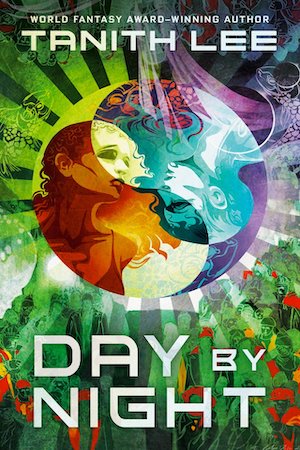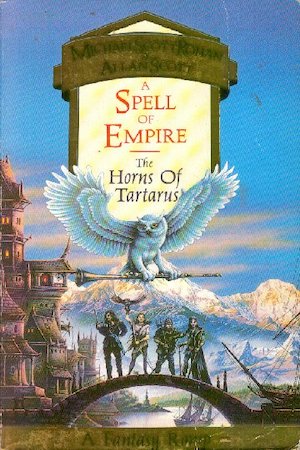The movie Tremors 2: Aftershocks features a memorable scene in which Burt Gummer (played by Michael Gross), having just discovered a heretofore unknown to Gummer fact about the life cycle of the animals he is trying to manage, indignantly complains “I feel I was denied… critical… NEED TO KNOW… INFORMATION.”
We’ve all been there, although perhaps not in quite the same circumstances as poor Gummer. So have many protagonists. After all, a poorly informed (deliberately or otherwise) protagonist is more easily led into entertainingly ill-advised action. Enjoy the following five works in which protagonists are afflicted with plot-facilitating ignorance.
The Reproductive System by John Sladek (1968)

Faced with impending bankruptcy due to declining sales, the board of the venerable Wompler company pivot from toys to arms. Exactly what role a doll company can fill in the military-industrial complex is unclear. However, as the board has always been fantastically ill-informed, they are not deterred by the fact that they do not know what they are doing.
The renamed Wompler Research Laboratories hires Calvin Potter to work under Dr. Smilax. Due diligence not being part of the corporate culture, nobody except Cal knows that the MIT that granted Cal his degree is not the prestigious Massachusetts Institute of Technology, but rather the less prestigious Miami Institute of Technocracy, or that Cal’s degree, Bachelor of Biophysics Arts, is unlike to be useful to Wompler. What’s worse: nobody at Wompler save Dr. Smilax himself suspects that Dr. Smilax is a mad genius whose research will surely doom humanity.
While the very real risk that humanity will be subjugated or exterminated by Smilax’s creations is arguably concerning, the novel does provide readers with a heartening message: because ignorance is no barrier to wealth, provided only that one attach oneself to the military-industrial teat, so too is manifest derangement no barrier to funding for mad scientists, provided that they find a sufficiently blinkered industrialist. Everyone wins! Except for all the dead people.
Day by Night by Tanith Lee (1980)

Why anyone would settle a desolate tide-locked world is a mystery. For the inhabitants of this particular desolate tide-locked world, why their ancestors chose this planet for their home is less important than the fact that the complex machinery on which their lives depend is beyond their ability to repair or maintain.
Cosseted in a palatial Residensia, tale-spinner Vitra was able to ignore the entropic doom facing her world. Now her Residensia is breaking down. Faced with begging for charity from other aristocrats or joining the poverty-stricken masses, Vitra boldly opts for a third option: frame fellow aristocrat Casrus for a crime and appropriate his property once he is convicted. This scheme worked perfectly in Vitra’s own fiction, so why shouldn’t it work in real life?
Yes, Vitra is trying to reuse the plot of a soap opera with which the masses are familiar. She does consider some of the obvious potential pitfalls in such a gambit. As it turns out, there are certain facts of which she is unaware, facts that are far more important than her bold scheme.
A Spell of Empire: The Horns of Tartarus by Michael Scott Rohan & Allan J. Scott (1992)

Left unemployed by the explosive results of his former employer’s research, apprentice alchemist Volker is happy to accept wine merchant Ulrich Tragelicht’s job offer. Volker joins a team whose members each possess both magical and musical talents… save for Ulrich himself, who knows magic but is tone-deaf.
The ostensible reason for Ulrich’s expedition to the Southern Empire is trade. Volker discovers that Ulrich’s true purpose is to confound malevolent cultists. It is a worthy cause (if only because, if successful, the cultists might doom the world). Therefore, when Ulrich is murdered, Volker steps in as leader. Too bad for Volker, his allies, and quite possibly the world, Ulrich died before he could explain just what his plan was.
Yes, this is a possibly-inspired-by-Warhammer-Fantasy-Roleplay novel in which we learn that the late Emperor Constans sounded suspiciously like Mario and Luigi from Super Mario Bros. In fact, I think it may be the only possibly-inspired-by-Warhammer-Fantasy-Roleplay novel in which we learn the late Emperor Constans sounded like Mario and Luigi.
Ansuz by Malene Sølvsten, translated by Adrienne Alair (2016)

Abandoned as a baby, Anna Sakarias has since been handed from foster home to foster home, scapegoated, bullied, and made a pariah. Were that not enough, she is plagued by terrible dreams. One might expect schoolmate Luna’s sudden insistence that Luna is Anna’s friend to be a welcome surprise. But Anna isn’t at all sure that she believes in Luna’s sudden volte-face.
Anna then discovers that Luna’s parents were Anna’s parent’s close friends. This is only one of many facts about which Anna finds she has been kept ignorant. For example, Anna owns a house in which she could have been living… if she’d known she owned it. Anna doesn’t know that she has magical powers; she doesn’t know that her dreams are visions! Most important of all: Anna doesn’t know that she is a potential threat to an other-dimensional queen… which is why even now assassins are hunting an ill-prepared Anna.
Luna’s parents thought Anna was safe with trustworthy people. That was a courageous belief, given that almost all of the adults in this book1 appear to be criminally negligent or actively hostile towards Anna. I would not trust most of the adults in this book to peel a banana without supervision, let alone raise a baby on whom the fate of worlds depends. The teens are not much better: Anna, although aware that a serial killer is stalking redheads in her region, does not mention to anyone her black hair comes from a bottle and her natural colour is red.
Daemons of the Shadow Realm by Hiromu Arakawa (2021 onward)

Yuru lives in a bucolic mountain village. While his parents fled years ago and he is functionally an orphan, he does have the company of his beloved sister Asa… in a way, as she is imprisoned in the village. Of the world beyond the village’s border, Yuru has little knowledge or interest. As Yuru discovers, the reverse is not true. There are those outside the village who know of and are keenly interested in Yuru and Asa.
The sudden incursion of hostiles into the village brings revelation. The most obvious fact? That the invaders are gleefully homicidal. Yuru soon learns that he can command demons, that he has been lied to his whole life, and the person he thought was Asa was only an imposter playing a role to keep Yuru from leaving the village. Why the ruse? Why are Yuru and Asa so important? To learn that, Yuru will have to venture into modern Japan, about which he knows nothing.
Manga fans may know Arakawa as the author of the life-affirming Silver Spoon agricultural coming-of-age manga. This is not that sort of manga. I am sure Silver Spoon fans would work that out by the time they reach the panel in which an extremely traumatized little girl watches her mother being gruesomely murdered… but perhaps a heads-up might be helpful (Fans of Arakawa’s Fullmetal Alchemist, on the other hand, will find just the sort of manga they expect.)
A protagonist’s ignorance of critical need-to-know information is a tremendously useful tool in any writer’s toolkit2. No surprise that the above works are only a very small sample of a very large pool of possible examples. It may be that I overlooked3 your favourites. If so, please mention them in comments below.
- With the possible exception of Anna’s caseworker Greta, who like Anna is ignorant of vital, need-to-know information and thus does not have the means to make an informed decision.
- One might argue almost every mystery novel requires protagonist ignorance.
- Or deliberately chose not to mention, to better serve my ultimate goal of—but that would be telling.











Second only to the Idiot Plot as the laziest and most frustrating plot device. Thanks for the list of stories to avoid.
Characters intentionally being kept ignorant and learning the truth is not equivalent to an idiot plot, if done right. People here and now are often kept in ignorance of things that should be considered salient to their own life; I know of high school students, here in Canada, within my lifetime, whose parents told them they couldn’t dance with a boy at their graduation party or they’d get pregnant. And that’s far from the only recent or egregious example; propaganda and misinformation is all over.
Characters not knowing something CAN be badly contrived and include common sense gaps that the person themselves would know. But the general idea can be made to work. What I think couldn’t work is a story where the people keeping others in ignorance are in any way the heroes.
I keep encountering undergrads who have been denied theoretical and practical cooking training. That’s great for the take out industry, not so good for students on a limited budget.
Decades and decades ago, UW chem had a very bright student whose high school didn’t have a chem lab. So, the student had a superlative grasp of theory and no experience with practice. Many learning experiences ensued.
As you know, chemistry labs are just the place to find out just how wrong the statement “what don’t know can’t hurt you” is.
The latter bit reminds me of a fellow student who also had a lack of practical lab experience before coming to UW. Although one would think that “stop pouring the glacial acetic acid before it overflows the burette,” would be easy to figure out from first principles.
My hand was OK, although I had cravings for french fries for about a week.
It depends on who could have given them the information and why didn’t they. If the book does answer that, I have no problem.
If it doesn’t or if it explains it as a deus-ex-machina (like the information holder dies before passing it on) then I agree with you.
A deus ex machina is a contrived coincidence that resolves the plot. A contrived coincidence that causes the plot is perfectly acceptable.
That’s an excessive reaction. A Spell of Empire, for instance, is entertaining and has relatable characters. And look at the authors’ names!
Dan Simmons’s Ilium and Olympos come to mind: one strand of the plot revolves around people rediscovering the control systems for their environment. How the group of people managed to forget how to use the systems in the first place is not adequately addressed. Also the information on what to do is given out by a mysterious wizard-type in driblets rather than all at once. Why? As far as I could tell, because a full immediate set of instructions would derail the author’s intended plot.
Sometimes there can be a justified “you can’t handle the truth immediately!” When it comes to explanations of how electrons are related to atomic nuclei, people are usually started with the notion of the electrons orbiting like a miniature solar system. Over a few years of chemistry classes, they get to “bonding” with electron pairs, still looking like those orbits, then orbitals and “hybrid orbitals”, then molecular orbitals involving wave-function calculations. Most people need to get used to the concepts and learn more and more advanced math before they can handle the real picture… such as we currently understand it. Very few people get to the “wave function calculations with relativistic corrections” level.
I think the forgetting was related to the deaths of something like 99.999% of humans.
Well, Wheel of Time Fans should be bored by these tame expamples.
Of course there are whole genres of stories where ignorance not only drives the plot, it is the plot. Mysteries, thrillers, a large amount of horror, Big Dumb Object stories, etc.
Having just finished Bethany Jacobs’ These Burning Stars, I can not only heartedly recommend it but feel it has more characters who are “denied… critical… NEED TO KNOW… INFORMATION” than any book I’ve read.
Some of the worlds colonized by slowboat in Niven’s Known Space stories would not have been colonized if the automated probes assessing them had done proper evaluations of their habitability – We Made It, for instance, or Plateau, or Jinx. Don’t know if this really counts as plot-facilitating ignorance, except perhaps in the case of Plateau.
Bujold’s “Penric and the Bandit” is based on the titular bandit not knowing that pale, effete-looking Penric is probably only slightly less dangerous than a sack full of nitroglycerin bottles, although he’d probably find cobras a more understandable comparison.
Sorry for being pedantic, but isn’t the correct term “tidally locked“?
•••
In Artificial Condition, Murderbot, who is the best of all possible bots, reluctantly teams up with an aggressive research transport spacecraft to discover some horrifying secrets about its past.
(spoiler alert)
Murderbot is ignorant of many things, but its former corporate overlords deliberately erased its memories of a massacre that it was an unwitting participant in.
Ignorance is not bliss for Murderbot, but neither does knowledge bring it happiness.
I was pleased that Wells didn’t drag out the mystery through story after story. Once MB was a free agent, it went to go find out what it could. And did. Protecting some soft humans and making a few bad one go bye-bye was just gravy.
“Tidally locked” is the standard term, but a web search for the exact phrase “tide-locked” turns up several scientific papers using the phrase in their titles, so I guess it’s a valid alternative.
Does The Night of Kadar count? Given that we know from the start the colonists have been deprived of certain crucial memories? Plus the colonists also do? That is, does knowing the extent of your own ignorance disqualify you as a character (and by extension, the book)?
Mur Lafferty’s Six Wakes combines plot ignorance and mystery with the protagonists waking up on a spaceship and rapidly realizing that a) they are clones who’ve had recorded memories installed, b) the originals have been brutally murdered, and c) the deceased people lived for decades after the most recent memory recording.
It should be noted that the previous versions were clones as well. What was different was that the new bodies were not imprinted with the latest memories.
There’s also Walter Jon Williams’ Voice of the Whirlwind, which also starts with a clone waking up with out-of-date-memories and trying to figure out what’s happening
It’s been a while since I read Dreamsnake by Vonda McIntyre, but ISTR that the plot and setting are strongly affected by the general lack of a few small but crucial bits of knowledge. In this case it’s about how to encourage an extremely valuable medical assistance animal to breed.
I remember distinctly the feeling of discovering, along with Snake, that her entire culture has missed these very important facts for entirely understandable reasons.
According to quote web sites, it’s in Roger Zelazny’s “Sign of the Unicorn” that someone, I suppose probably Prince Corwin of Amber, says, “To paraphrase Oedipus, Hamlet, Lear, and all those guys, I wish I had known this some time ago.”.
Prince Corwin woke up a few books earlier with a lot of amnesia, and prior to that, he does not seem to have been very curious. So a lot has been going on, for a long time, that he didn’t know about.
The protagonist of Naomi Novik’s Scholomance series is missing two absolutely key pieces of information until near the end, which explain the things that have been inexplicable to her all along. She didn’t have the information because, in one case, it’s highly classified and everyone who knows is magically compelled to keep mum about it, and in the other it’s the result of a crime against humanity that the perpetrator naturally took steps to cover up. (Actually they’re both crimes against humanity, which is the main problem in the story)